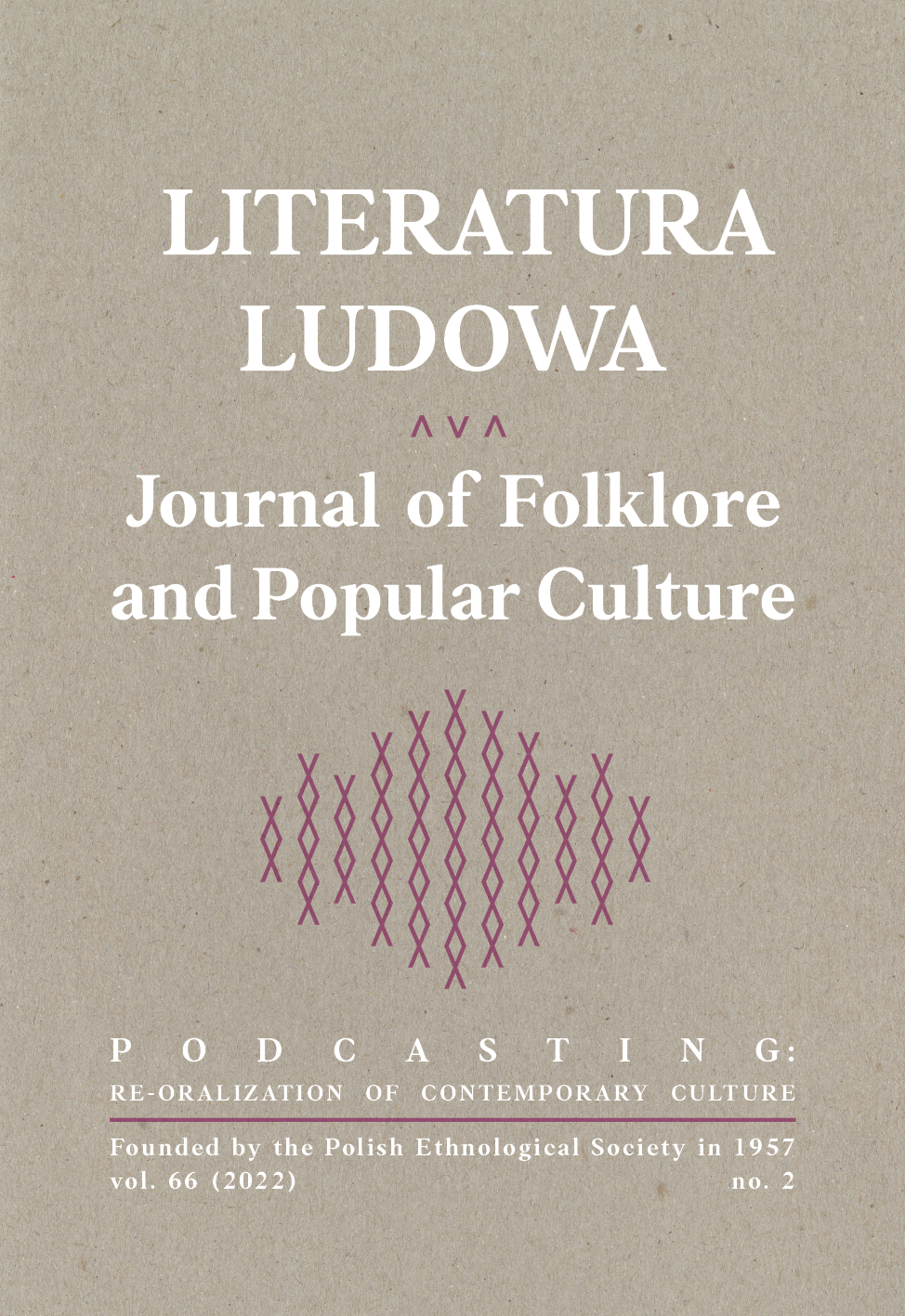Opinions on the Podcast Raport o stanie świata among Sponsors Supporting the Podcast Financially
DOI:
https://doi.org/10.12775/LL.2.2022.005Keywords
radio, sponsorship, new media, podcastingAbstract
The podcast Raport o stanie świata (Report on the State of the World) is a recognizable brand on the Polish media market because of the quality of production and the personality of its creator – Dariusz Rosiak. Raport… is a subjective commentary on world events by Rosiak and his associates. Its recipients are a faithful and very conscious group of listeners who have a clear opinion about this production. This applies especially to the podcast patrons who support its activities financially and guarantee its functioning. The aim of the study was to find out what the patrons’ opinions about the podcast are. In this context, it was also important to check who the respondents are and from what perspective they evaluate it. The members of the research team joined the closed group of patrons of the Raport... on FB. It was used to conduct a survey with 80 respondents. The research took place between May 10 and May 21, 2021. The survey was created and distributed on the Google Forms platform. In addition, four pre-structured interviews with patrons were conducted via the Messenger application, which allowed for the implementation of some qualitative research. The interviews were recorded and transcribed. The participants of the research point towards the high professionalism of the production, its educational character, as well as the independence of the creators. They also appreciate the fact that the program is distributed in the form of a podcast, which allows one to peruse it repeatedly, anywhere and anytime.
References
Berry, R. (2006). Will the iPod kill the radio star? Profiling podcasting as radio. Convergence: The International Journal of Research into New Media Technologies, 12(2), 143–16 2. https://doi.org/10.1177/1354856506066522
Berry, R.(2015a). Considering podcastng evolution. The Radio Journal, 14(1), 7–22.
Berry, R. (2015b). A golden age of podcasting? Evaluation serial in the context of podcasts histories. Journal of Radio and Audio Media, 2(2), 170–178.
Bochyńska, N. (2020, 15 stycznia). Dariusz Rosiak odchodzi z Polskiego Radia. Nie przedłużono umowy. Wirtualnemedia. https://www.wirtualnemedia.pl/artykul/dariusz-rosiak-odchodzi-z-trojki-nieprzedluzenie-umowy-raport-o-stanie-swiata-dlaczego-opinie-kariera
Bonini, T. (2015). The „second age” of podcasting: Reframing podcasting as a new digital mass medium. Quaderns del CAC, 41(18), 21–30.
Bottomley, A.J. (2015). Podcasting: A decade in the life of a ‘new’ audio medium: introduction. Journal of Radio and Audio Media, 22(2), 164–169.
Doliwa, U., Chyczewska, A., Grobelski, F., Łatacz, R. (2020). Podcasting w Polsce – próba analizy zjawiska. Media – Kultura – Komunikacja Społeczna, 1(15), 37–54. https://doi.org/10.31648/mkks.5119
Doliwa U., Szydłowska, M., Szczepańska, P., Stachowicz, A., Kaźmierczak, P. (2022). Crowdfunding jako metoda finansowania podcastów – analiza motywacji patronów wspierających „Raport o stanie świata”. Media – Biznes – Kultura (w druku).
Erling, B. (2020, 14 października). „Raport o stanie świata” z nowym podcastem. Press. https://www.press.pl/tresc/63557,_raport-o-stanie-swiata_-z-nowym-podcastem?fbclid=IwAR2rp0xNX9Fx73ho2BvtHQQiv3P42wBG1PHjWSg8rN88iENFdAE_T2VEyZQ
Facebook (2020a, 16 stycznia). Raport o stanie świata Dariusza Rosiaka. https://www.facebook.com/raportostanie/posts/3329168070487400
Facebook (2020b, 26 lutego). Raport o stanie świata Dariusza Rosiaka. https://www.facebook.com/raportostanie/posts/3452044034866469
Facebook (2020c, 7 marca). Raport o stanie świata Dariusza Rosiaka. https://www.facebook.com/raportostanie/posts/3483463801724492
Facebook (2020d, 25 marca). Raport o stanie świata Dariusza Rosiaka. https://www.facebook.com/raportostanie/videos/659363848211364/
Gillmor, D. (2006). We, the media. Grassroots journalism by the people, for the people. Sebastopol: O’Reilly Media.
Hammersley, B. (2004, February 12). Audible revolution. The Guardian. http://www.theguardian.com/media/2004/feb/12/broadcasting.digitalmedia
Instytut Wolności (2020, 6 lutego). Raport o stanie świata z Muzeum Powstania Warszawskiego [plik wideo]. YouTube. https://www.youtube.com/watch?v=CzSbqkKfY0s&t=7s
Kapuściński, R. (2013). To nie jest zawód dla cyników. Warszawa: PWN.
Kurek, P. (2020, 6 sierpnia). Polaków nie interesują podcasty. Dane Spotify mówią co innego. Antyweb. https://antyweb.pl/spotify-podcasty-w-polsce-ciesza-sie-spora-popularnoscia
kw (2015, 4 grudnia). Dariusz Rosiak laureatem Nagrody PAP im. Ryszarda Kapuścińskiego. Portalmedialny.pl. http://www.portalmedialny.pl/art/51778/dariusz-rosiak-laureatem-nagrody-pap-im-ryszarda-kapuscinskiego.html
Madsen, V. (2009). Voices-cast: a report on the new audiosphere of podcasting with specific insights for public broadcasting. Conference Proceedings. ANZCA09 Communication, Creativity and Global Citizenship. Brisbane.
McQuail, D. (2007). Teoria komunikowania masowego (przeł. M. Bucholc, A. Szulżycka). Warszawa: Wydawnictwo Naukowe PWN.
Menduni, E. (2007) Four steps in innovative radio broadcasting: From QuickTime to podcasting. Radio Journal: International Studies in Broadcast & Audio Media, 5(1), 9–18.
Rosiak, D. (b.d.). Raport o stanie świata Dariusza Rosiaka. https://raportostanieswiata.pl/
Spinelli, M., Dann, L. (2019). Podcasting. The audio media revolution. New York–London: Bloomsbury.
Stachyra, G. (2016). Podcasting w perspektywie specyfiki produkcji radiowej. Media – Kultura – Komunikacja Społeczna, 4(12), 71–89.
Stachyra, G. (2017). Podcasting jako technologia audio. Perspektywy rozwoju. Media Studies, 68(1), 29–45.
Downloads
Published
How to Cite
Issue
Section
License
Copyright (c) 2022 Urszula Doliwa, Piotr Kaźmierczak, Ada Stachowicz, Paulina Szczepańska, Magdalena Szydłowska

This work is licensed under a Creative Commons Attribution-NoDerivatives 4.0 International License.
1. The authors give the publisher (Polish Ethnological Society) non-exclusive license to use the work in the following fields:a) recording of a Work / subject of a related copyright;
b) reproduction (multiplication) Work / subject of a related copyright in print and digital technique (ebook, audiobook);
c) marketing of units of reproduced Work / subject of a related copyright;
d) introduction of Work / object of related copyright to computer memory;
e) dissemination of the work in an electronic version in the formula of open access under the Creative Commons license (CC BY - ND 3.0).
2. The authors give the publisher the license free of charge.
3. The use of the work by publisher in the above mentioned aspects is not limited in time, quantitatively nor territorially.
Stats
Number of views and downloads: 477
Number of citations: 0



